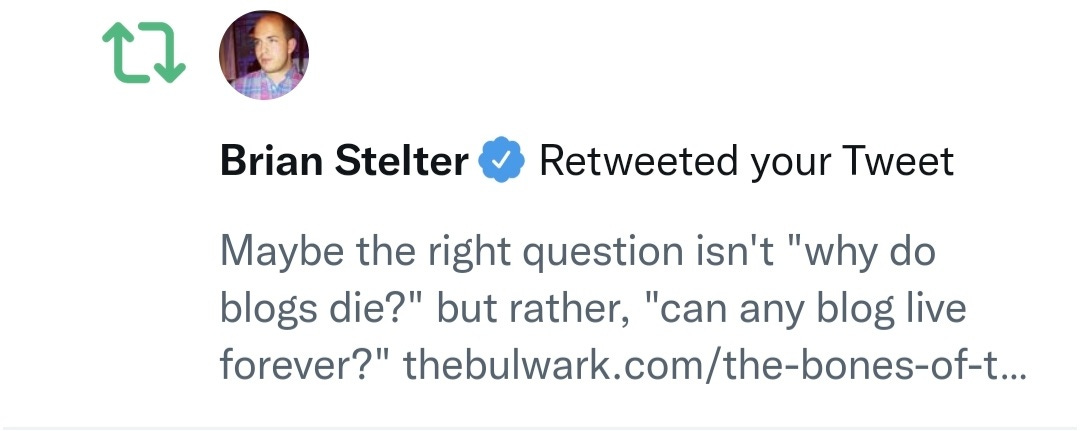Last week I had a piece in The Bulwark on the phenomenon of “dead blogs”: publications-of-one that were written by passionate hobbyists, researchers, or enthusiasts, and which after many years of really interesting work just stopped updating one day.
Here’s a good bit of it, but read the whole thing:
Blogging well requires a tremendous amount of work, including work along the lines of what the socialists call “emotional labor.” That’s evidenced by the phenomenon of the dead blog: one that simply stops updating one day and becomes essentially abandoned.
When a magazine closes down, it goes out a bit like a restaurant or a store. There will often be a final publishing day, maybe a heartfelt note to the readers about the difficult media landscape, a last hurrah. Many websites of shuttered magazines remain online for years, frozen indefinitely; they look just as they did on their final day. Others see their archives moved over to another site, or simply vanish into cyberspace.
For dead blogs, however, the pattern is usually different. Sometimes they end following a building sense of boredom or despair; other times they just end suddenly, with no acknowledgement or last words. Sometimes, a blog’s death is something a reader must divine, rather than a fact explicitly stated by the writer. Quite often, a blogger will intend to get back to blogging, and may even occasionally take a stab at it—“long time no write,” they say guiltily, promising to “post more regularly now”—so it can be debated whether such a blog is really dead. Often, a years-old unfulfilled promise to write more becomes a blog’s unwitting valediction.
A couple of people thought my point was that blogging is dead, but I wasn’t saying that. Rather, I was discussing specifically those blogs which are dead. I even included three examples of old-fashioned blogs that are still chugging along, although at this point the vast majority of such publications that were ever started probably are abandoned. Some of them are written by professionals, but most of the ones I’ve followed over the years are quirky compendiums of information by passionate amateurs.
This piece must have hit a nerve, because take a look at this:
And this:


Brian Stelter is a CNN anchor, and Robert Kelly is a professor in South Korea, known to the internet as the “BBC Dad.”
I show you these not to brag, but because it’s really cool that people much deeper into this industry than I am found this piece spoke to them.
My question, after a lot of general discussion about blogs, was this: Is there a right way for a publication to die? Is it even quite right to call an abandoned blog “dead”?
I’ve had a thought like this about restaurants. A restaurant can close down because of a tragedy—a fire, the death of the owner. It can also close because the owners retire after many successful years. And of course, it can fail and go out of business. But “closed” and “gone out of business” don’t actually mean the same thing. In the case of retirement, you could even call it completion rather than closure. That particular project went on as long as it could, and it was closed down, but it didn’t really die or fail. Just about every business eventually ends, but what exactly that end is can differ.
In terms of blogging, how good the technology/publishing platform is, and how finely the blogger takes care of small details, can make these personal publications look really slick. But it also disguises the sheer amount of effort that goes into it. Again, like a business. I wrote this back in 2020, about struggling businesses in rural Virginia, at the far exurban edge of the D.C. metro area:
Whether these businesses out at the edge of the D.C. metro area reopen, shut down, or sell, their owners deserve admiration. Whether it’s the trails and fences at Rocking S Ranch or the hot springs and guest rooms at Pembroke Springs Retreat, keeping places like these in order entails endless work. Making them fun, relaxing, and welcoming is a vocation. The better that such work is done, ironically, the more invisible it is and the more effortless it appears.
A stiff window or a rusty fixture is everyday life for a homeowner; for an innkeeper, it can be a casual negative review with material consequences. Meeting the rising expectations of consumers is difficult enough in ordinary times.
Another interesting point I touched on is that while magazines and newspapers have institutional structures to hand down the publication to new and ever-changing teams and staff, a blog is almost always a project of one. I wonder if there are any cases at all of a blog being handed over to another person to continue it, after the original author gives it up.
I also wrote this:
These spunky publications are cultural resources. Many of them contain immense amounts of information and research that would be more or less impossible to gather again. Many will one day serve as vital sources for piecing together the commercial and cultural history of the twentieth and early twenty-first centuries.
And so I have a question for you: Have you ever come across or followed a blog (or someone’s personal website, etc.) that was the only source for some obscure but important (to you, anyway) piece of information? I’m thinking about the retail history blogs I mentioned in the piece, which between their posts and comments sections, are absolutely full of 20th century retail trivia that would be very hard to find, and centralize, again. It fascinates me how people who do this stuff out of personal interest end up being historians, possibly without ever thinking about it that way.
Finally, here’s a tweet I sent asking for anybody’s examples of dead blogs they knew of. There are some interesting replies/examples in here. Check them out.

Related Reading:
Why Not Put the Meat *In* the Bread?
Please consider upgrading to a paid subscription to help support this newsletter. You’ll get a weekend subscribers-only post, plus full access to the archive of nearly 300 posts and growing. And you’ll help ensure more material like this!




